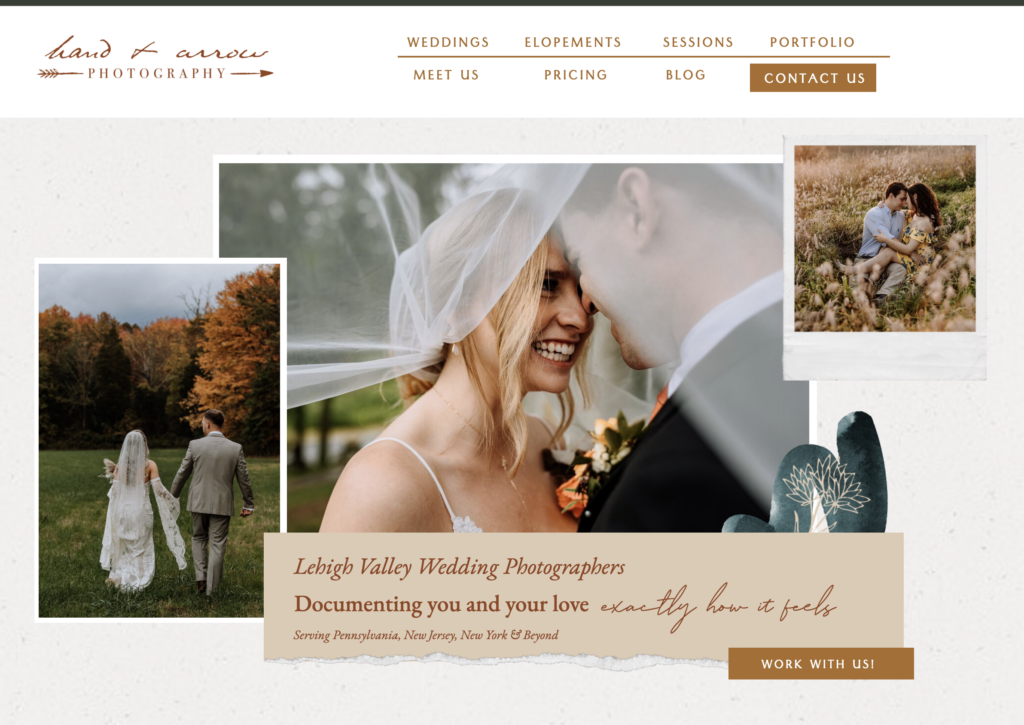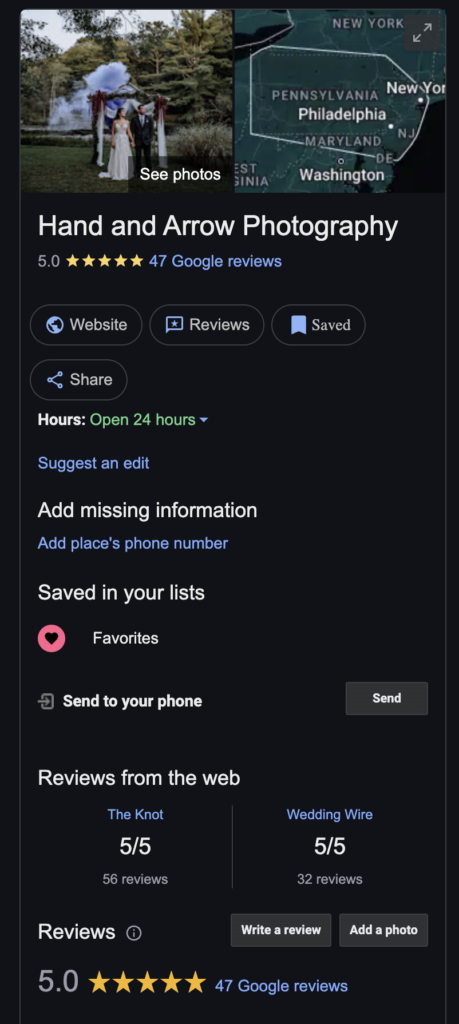We're a team of wedding, elopement and portrait photographers who put community over competition. We provide tips and resources for Photographers looking to up-level their businesses.
We're here to help When you join The Photography Business Academy
A Photographer’s Guide to Marketing Channels: Finding What Works for Your Business
Marketing can often feel elusive, especially for photographers who are already juggling a lot in their businesses. With so many marketing channels available, it can be tough to figure out which will deliver the best results.
In this blog post, we’ll break down some of the most effective marketing types for photographers, exploring the pros and cons of each to help you determine which channels are best suited to your business.
Before diving in, it’s important to understand that successful marketing requires clarity. Confidence in your marketing comes from knowing exactly where your business is headed, understanding your audience, and ensuring you have a solid brand and website to “sell” your services before potential clients even reach out. Once you have these foundations in place, marketing becomes much more effective (and dare we say…easier?!)

Popular Marketing Channels for Photographers
Word of Mouth (Clients, Business Partnerships, and Collaborations)
- Pros: One of the most powerful forms of marketing. It’s free, and referrals from past clients or business partners often come with a high level of trust and credibility.
- Cons: It’s not always predictable. Relying solely on word-of-mouth can limit your business’s growth if you don’t have consistent leads coming in.
Word of mouth is particularly effective in the photography world, where trust and reputation are key.
Partnering with other vendors, such as wedding planners or makeup artists, can help generate referrals, and happy clients are likely to recommend you to friends and family.
Our biggest successes in this area have been…
- Partnering with other photographers to share referrals, growing each others businesses
- Partnering with wedding venues to establish relationships with them and get referrals for their clients wedding days
- Providing better client experiences that leave our clients wanting to refer us to their friends and family

- Pros: A visually-driven platform, perfect for photographers to showcase their work. Instagram offers a variety of tools like Reels, Stories, and posts to engage with potential clients. It also helps you build a strong personal brand.
- Cons: The algorithm can be difficult to navigate, and building a following can take time. You’ll need a consistent posting strategy and engagement plan to get results.
Instagram’s visual focus makes it a natural marketing platform for photographers.
However, success on Instagram requires more than just posting beautiful photos (though – that definitely helps!). You need to actively engage with your audience, use relevant hashtags, and take advantage of all the platform’s features to maximize visibility.
In our experience, Instagram can be a marketing tool, but typically will require a lot of consistent, regular usage to see results…and results can die down if you slow down using the platform (which makes sense – since the platform wants to prioritize showing active users to other active users). Still, over the years we’ve had a lot of success using it as a part of our marketing strategy!
These days, creating reels (short form video content) is a key part of a photographer’s IG marketing strategy as this content universally performs better than most static image posts.

- Pros: Great for community-building, especially through groups or event promotions. It offers targeted advertising options that can help you reach specific demographics.
- Cons: Organic reach on Facebook has declined, making it harder to get noticed without paid advertising.
Facebook can be a great platform to engage with your local community or niche groups related to your photography. However, the days of relying solely on organic reach are over, so many photographers turning to Facebook ads to gain visibility.
One of the last bastions of organic engagement on Facebook is FB groups, and creating a solid local group can provide great results in many areas! While organic reach even in groups is on the decline, this method gives more opportunities for engagement and can also be used to get people into email marketing if you collect their email addresses!
Website Marketing (SEO/Content)

This is one of my personal favorite places to market my photography business! 🙂
- Pros: Long-term growth potential with little ongoing cost. By optimizing your website for search engines (SEO) and consistently creating valuable content, you can attract clients passively.
- Cons: SEO takes time to build up, and content creation can be resource-intensive.
Your website is the cornerstone of your marketing.
A well-designed, SEO-optimized site that offers helpful content (like blogs or guides) can drive organic traffic and bring in leads consistently over time.
This is one of the best ways to create a sustainable lead generation machine for your photography business.
In my experience, SEO has been massively important to my success as a photographer – and there’s many reasons for it.
- You have control over the content and the platform it’s hosted on (you own it, it’s yours!)
- You can do SEO research to help target better opportunities with your content to actually attract the right audience to your business
- This content can generate organic traffic over time, and also be used to support other marketing channels
If you want help with SEO, our SEO and Blogging for Photographers Course covers this in depth with easy to follow videos!
Trade Shows and Events
- Pros: In-person marketing is great for building personal connections. Trade shows and events allow you to showcase your work and network with other vendors and potential clients.
- Cons: They can be expensive and time-consuming, with no guarantee of immediate return.
Trade shows are a great opportunity to meet potential clients face-to-face and demonstrate your work in a tangible way. However, the costs associated with booking a booth, travel, and materials can add up, so it’s important to weigh the potential return on investment.
Maybe even more important is selecting the right trade show – as some are well established and consistent in quality, while new ones may be a little iffy in what you can expect out of it.
Personally, I have been drawn to intimate shows at specific wedding venues where I know the audience that is being attracted there is going to heavily overlap with my style. This is where I’ve had the most success as a wedding photographer.
We created a list of popular trade shows and events for photographers to set up at you can also check out!
Paid Advertising (Google Ads, Meta Ads)
- Pros: Provides immediate visibility and can be highly targeted to specific audiences. Paid ads can help you get in front of potential clients who are actively looking for photography services.
- Cons: Requires a budget, and there’s a learning curve to set up effective ad campaigns.
Paid advertising, whether on Google or Meta (Facebook/Instagram), can deliver fast results.
Of course, in exchange for “fast” there is a cost.
You can target specific demographics, interests, or even people who have visited your website before. However, it’s important to set clear goals and track your results to ensure you’re getting a good return on investment (ROI).
In our experience, paid advertising is not something we prioritize but if we did, we would only do this after ensuring you have solidified your branding, website, market messaging, audience targeting, and sales process.
While all of these things are important no matter what type of marketing you are doing, you are more likely to have poor results with paid advertising (and feel the sting of wasted money) if you do not have these principles in place in your business.
In practice, a solid photography business should be able to get good results with other organic marketing channels, and use paid marketing to support an already good thing.
Directory Listings

- Pros: Popular directories that bring in couples actively looking for photographers. Having a profile on these platforms can increase your visibility to a specific target audience. Most directories also allow you to collect client reviews, which is a valuable form of social proof.
- Cons: Listings can be expensive, and it’s a competitive space where many other photographers are advertising.
There are many directory listing websites that you can sign up for including ones like –
- Google Business
- Yelp
- The Knot
- Wedding Wire
The best directory listing is Google Business since it is free and has direct, tangible benefits for service providers and can positively impact your SEO performance.
Niche specific directories can be valuable for photographers because they put your services in front of a more targeted audience. However, there are a few things to consider with some niche specific directories in particular –
- Standing out from the competition can be challenging, so it’s important to make your profile as compelling as possible.
- Some platforms are very expensive for what you receive
- Platforms like Wedding Wire and The Knot are notorious for using high pressure sales tactics, make it difficult to get out of contracts, and are facing legal action for their lead quality.
In general, we would not rely or otherwise bet our marketing strategy as photographers on directory listings. They can compliment a strong marketing strategy that utilizes other channels that you have more control over, but can also be a time and money waste.
We put together a list of directories for photographers to use as a quick reference.
Email Marketing

If you already have had some photography clients, you should be taking advantage of, at the bare minimum, marketing new offerings to them!
- Pros: Highly effective at nurturing leads and staying top-of-mind with potential clients. Once set up, email campaigns can be automated, making them a low-effort, high-reward channel.
- Cons: Building an email list takes time, and not everyone will open your emails.
Email marketing allows you to keep in touch with past clients and nurture leads who may not be ready to book immediately.
By sending out regular newsletters, promotions, or helpful tips, you can build relationships over time and convert leads when they’re ready.
Referral Programs
- Pros: Encourages word-of-mouth by rewarding clients for referring new business to you. Referral programs are often low-cost and high-reward.
- Cons: Setting up a program and tracking referrals can be time-consuming.
A referral program incentivizes past clients to send new business your way by offering them discounts or rewards. This can be an excellent way to generate more word-of-mouth marketing while giving your clients an extra reason to spread the word.
Giveaways
- Pros: A great way to generate buzz and bring in new leads. When done correctly, giveaways can attract a large audience in a short amount of time.
- Cons: Giveaways often attract people interested in free services rather than paying clients. They also require careful planning to ensure they align with your business goals.
Giveaways are popular on social media and can quickly expand your audience. However, it’s important to structure your giveaway in a way that attracts qualified leads rather than people just looking for a freebie. Offering a session with limited add-ons or a discounted package can help filter out less serious participants.
The Importance of Diversifying Your Marketing Efforts
One of the most important principles in successful marketing for photographers is diversification.
Relying solely on one marketing channel can be risky and may limit your business’s growth. While certain channels might deliver quick wins, they can also experience fluctuations—algorithms change, ad costs rise, and trends come and go.
By diversifying your marketing efforts, you’re not putting all your eggs in one basket.
This means combining several different marketing channels that work together to generate consistent results over time.
For example, you can use Instagram to engage with potential clients, SEO to attract long-term traffic to your website, and email marketing to nurture leads. Each of these channels has its strengths, and when used together, they create a robust marketing system that can keep your business thriving even if one channel slows down.
And the most important piece here is that you can use many of these different marketing channels together to create synergies so you’re spending less time marketing and getting more results, as a result.
Diversification also helps you reach different types of clients through different methods. Some people might find you through social media, while others may prefer searching for photographers on Google.
A well-rounded marketing strategy ensures that you’re not overly reliant on a single source of leads and can generate more stable, long-term growth for your photography business.
Choosing the Right Marketing Channels for Your Photography Business
For many photographers, especially solopreneurs, it’s important to be selective with your marketing efforts. Not every channel will be worth your time or money.
If you need immediate cash, we would recommend finding alternative options for work, like getting hired for some jobs using ShootWith.Me, while you build out your marketing strategy and efforts.
By making a more sustainable marketing plan, you’ll actually unlock the consistent results you are actually wanting.
Monitoring and Improving Your Marketing Strategy
As you implement your marketing efforts, it’s important to monitor the data to see what’s working and what isn’t. By keeping an eye on your performance, you can make adjustments and optimize your strategy over time.
Remember, the compounding effect of marketing means that the more channels you have working together, the greater the impact over time. Consistency is key, and by carefully selecting the right marketing channels and building a holistic strategy, you’ll be able to market your photography business with confidence.
Learn Marketing and Business with Shoot and Thrive
We’ve created the Shoot and Thrive Photography Business Academy – a 9 course library for photographers to help teach you more about running a successful business.
The full library covers every topic you need to know about in great detail with walkthroughs and additional resources to help you implement into your business. Courses can also be purchased individually like our branding course and marketing course.
We go beyond teaching, and give you tools and community support to actually have success by taking our teachings and putting them into actionable advice you can start working on in your business today.

Honesty is a cornerstone of Shoot and Thrive, so we want you to know that some links in this post are affiliate links. This means we may earn a commission if you make a purchase—at no additional cost to you. We only recommend products and services we trust, have used ourselves, or have thoroughly researched based on industry feedback. Our goal is to provide solutions that genuinely help, whether they come from our direct experience or the collective knowledge of the photography community.
As photography business educators, we believe it's important for educators in this industry to be active photographers themselves. The images used throughout this website were taken through our photo studios - Hand and Arrow Photography and Marshall Scott Photography, except for stock images or if otherwise noted.
Turn Your Passion into a Thriving Business
Transform your photography business into a streamlined, profitable venture that gives you more time, freedom, and confidence.
With the Photography Business Academy, you’ll have a step-by-step guide to building the business—and life—you’ve always dreamed of. From branding to marketing, finances to client experience, we’ve got you covered.
Navigation
Shoot and Thrive is an ethically created resource for photographers needing mentorship, coaching, or business education. We believe in creating content that’s easy to digest and retain while incorporating educational best practices, so you gain clarity and confidence as a business owner.